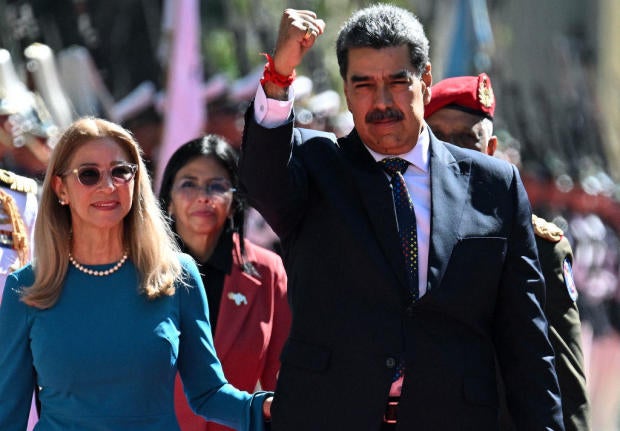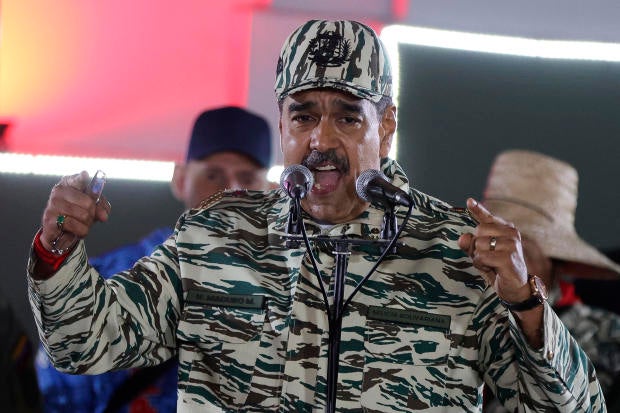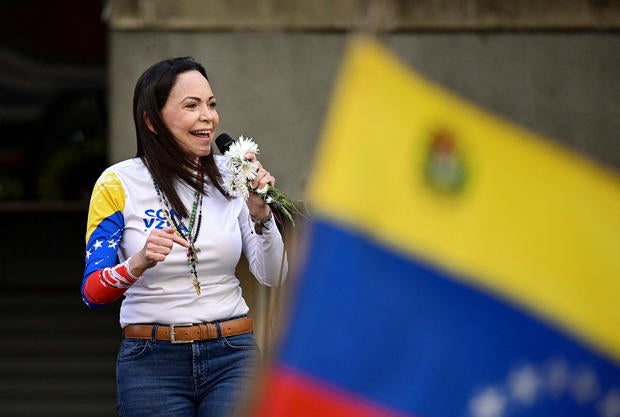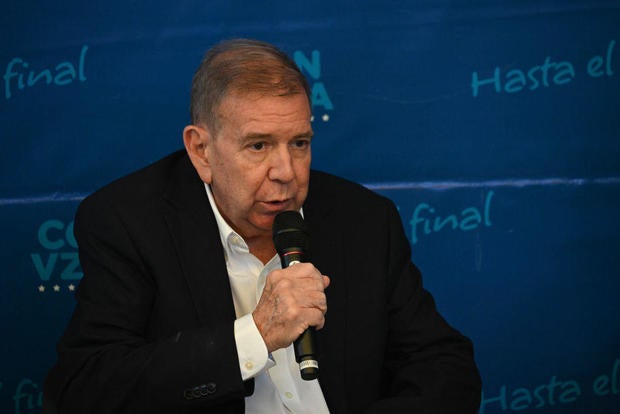
Venezuela’s Maduro sworn in for 3rd term amid outcry over election, opposition leader Maria Corina Machado’s detention
Caracas — Venezuela’s President Nicolas Maduro, in power since 2013, was sworn in for a third six-year term on Friday despite a global outcry that brought thousands out in protest on the eve of the ceremony.
Opposition leader Maria Corina Machado, who came out of hiding to lead a demonstration in Caracas on Thursday, was briefly detained after the rally according to her team, reigniting international condemnation of Maduro’s alleged vote steal and cowing of critics.
The government denied arresting Machado, but the vocal critic of Maduro was detained by security forces who intercepted her convoy following an anti-government rally in Caracas, her team said. Witnesses reported gunfire as her motorcycle was forced off the road and she was forcibly taken away.
FEDERICO PARRA/AFP via Getty Images
Standing before officials on Friday, Maduro was sworn in at Venezuela’s legislative palace.
“I swear by Bolivar, by Sucre, by Urdaneta, by Manuela Saez, by the eternal memory of our eternal commander Hugo Chavez … I swear by history, I swear by my life,” Maduro said.
In a fiery speech following his swearing-in, Maduro accused external powers of “attacking” Venezuela, taking digs at the U.S. government and foreign critics, and he promised to guarantee “peace and national sovereignty.”
“Today more than ever I feel the weight of commitment, the power that I represent, the power that the constitution grants me,” he said. “I have not been made president by the government of the United States, nor by the pro-imperialist governments of Latin America.”
Trump, other world leaders react to Machado’s detention
In a social media post, President-elect Donald Trump branded Machado and Edmundo Gonzalez Urrutia — the man who took her place on the ballot and is widely accepted to have beaten Maduro in elections on July 28 — as “freedom fighters.”
They “should not be harmed, and MUST stay SAFE and ALIVE,” he wrote on his Truth Social network.
During his first term in office, Trump tightened punitive measures against the Maduro government for anti-democratic actions. The sanctions were partly lifted, then reimposed, by his successor President Biden, and may well be hardened during Trump’s next term, which begins in just 10 days.
Secretary of State Antony Blinken said in a post on X that the U.S. stands “ready to support a return to democracy in Venezuela.”
“The Venezuelan people and world know that Nicolas Maduro clearly lost the 2024 presidential election and has no right to claim the presidency today,” Blinken said.
PEDRO MATTEY/AFP/Getty
Ecuador denounced what it called the Maduro “dictatorship,” while Spain expressed “total condemnation” of Machado’s detention, albeit brief.
Colombia, whose leftist President Gustavo Petro is historically an ally of Maduro, also condemned the “systematic harassment” of Machado, 57.
Italy’s right-wing Prime Minister Giorgia Meloni on Friday denounced “another unacceptable act of repression” in Venezuela, without mentioning Machado specifically.
“The news coming from Venezuela represents another unacceptable act of repression by the Maduro regime, whose proclaimed electoral victory we do not recognize,” Meloni said in a statement. “We intend to continue working for a democratic and peaceful transition. The legitimate aspirations of freedom and democracy of the Venezuelan people must finally be realized.”
Citing “an international conspiracy to disturb Venezuelans’ peace,” Freddy Bernal, governor of the frontier state of Tachira, said the border with Colombia was closed on Friday and will reopen Monday.
Defiant opposition leader Machado: “We are not afraid”
Machado earlier made a defiant speech to thousands of supporters in central Caracas, sending a message to the government that: “We are not afraid.”
Gaby Oraa/REUTERS
There was also a protest in Paris attended by Machado’s daughter Ana Corina Sosa and dozens of supporters.
Government opponents reported a new wave of repression ahead of Maduro’s swearing-in, including the arrest of another opposition presidential candidate, the head of a press freedom NGO, and Gonzalez Urrutia’s son-in-law.
The United Nations voiced alarm this week at reports of arbitrary detention and intimidation.
More than 2,400 people were arrested, 28 killed and about 200 injured in protests that met Maduro’s claim of election victory last year. He has since maintained a fragile peace through massive military and police deployments and with the help of paramilitary “colectivos” — armed civilian volunteers accused of quelling protests through a reign of neighborhood terror.
FEDERICO PARRA/AFP/Getty
Former diplomat Gonzalez Urrutia, 75, had voiced tentative plans to fly to Caracas this week to take power, but the plan is deemed unlikely to go ahead.
“Wanted” posters offering a $100,000 government reward for his capture have been plastered all over Caracas.
Gonzalez Urrutia has been on an international tour seeking to pile pressure on Maduro, 62, to relinquish power. It has included a stop in Washington to meet Mr. Biden, who called for a “peaceful transfer back to democratic rule.”
Maduro has been in power since 2013, following the death of left-wing firebrand Hugo Chavez, his political mentor. His re-election in 2018 was also widely rejected as fraudulent but he managed to cling to power through a mix of populism and repression, even as the economy imploded.
Maduro enjoys support from Russia and Cuba, as well as a loyal military, judges and state institutions in a system of well-established political patronage.
Thousands of ruling party loyalists held a rival demonstration in central Caracas on Thursday, vowing to prevent any attempt to thwart Maduro’s return to office.
Sanctions against Venezuela
In response to Maduro taking office for a third term on Friday, the U.S. Treasury Department slapped a new round of sanctions on Venezuelan officials.
The U.S. sanctions were placed on the president of Venezuela’s state-owned oil company, Maduro’s transportation minister and state-owned airline, and high-level military and police officials which the Treasury said had “roles in carrying out Maduro’s repression and human rights abuses against democratic actors.
“We’ve given Maduro and his representatives every opportunity to restore democracy, but they’ve chosen not to. So today, we’re building on all of our previous actions and making some decisions of our own,” National Security Council spokesperson, John Kirby, told reporters.
Additionally, the U.S. State Department is increasing its reward to $25 million for information leading to the arrest of Maduro and Diosdado Cabello, Venezuela’s minister of interior, justice and peace. The State Department also placed a new bounty of $15 million for information about Defense Minister Vladimir Padrino.
“Unfortunately Maduro has demonstrated once again his complete disregard for democratic norms and is proceeding with an illegitimate inauguration,” a senior Biden administration official told reporters on Friday.
In 2020, the State Department offered a reward of up to $15 million for information on Maduro. It also imposed new travel restrictions on an undisclosed number of Maduro-aligned government officials who the U.S. believes undermined the electoral process and were complicit in repression.
Source: cbsnews.com


